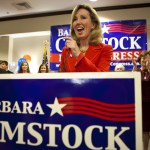Prime
 More On the Rolling Insurrection
More On the Rolling Insurrection 
In my series of posts about the specter of political violence seeping into conventional politics, one examples was in San Luis Obispo, California. San Luis Obispo isn’t Santa Monica or Marin. But it’s very much not one of the northern or rural counties in the east of the state that are very Republican and might as well be in Idaho or rural Nevada. It’s sort of middle of the spectrum – used to be fairly Republican but in recent decades has been more Democratic in national politics.
 Where Things Stand: Famously Clinton-Averse Former Legislator Supports Jan 6 Commission
Where Things Stand: Famously Clinton-Averse Former Legislator Supports Jan 6 Commission 
As the face of all things anti-Clinton, Barbara Comstock has been a TPM fan-fav villain for years. But she’s made an unlikely reemergence in recent weeks on a very different side of history.
We’ll get into that in a minute, but first, let’s hit the archives.

A brief addition on Manchin. A number of you have written in to cite a segment on Rachel Maddow’s show, apparently last night, which showed a bunch of polls that suggest the laws in question – infrastructure, voting rights, etc. – are actually very popular in West Virginia. So either Manchin is just confused or is doing something other than following the lead of his constituents’ more conservative views. I didn’t see the segment. The results as relayed to me do not surprise me. But these polls don’t necessarily mean what you think. You can’t really take them at face value.
Liberals or various people on the left will often point to polls which seem to show that Republican voters actually support liberal policies. We’re not winning elections but we’re winning on the issues. The answer is usually to push liberal policies more aggressively.
There are a lot of cases where Democrats should push liberal policies more aggressively. The COVID relief and infrastructure bills are good examples. But again, you can’t make a straight line between these polls and that end point.

From TPM Reader MW …
Re Josh’s post this morning, which includes these sentences:”There are a lot of people who are super mad at Joe Manchin. They say he’s a closet Republican. That’s not where I am. It’s more confusion because his points are contradictory.”
To give Manchin some (but not too much) benefit of the doubt, his contradictory statements may be a reasonably accurate reflection of the views of West Virginia voters. As we continually remind ourselves, in 2020 Trump won every county in West Virginia, and won the state by 38 points.These days that fact is usually brought up in reference to Manchin thinking he knows what he needs to do – and not do – to keep getting elected senator in WV. But those numbers might also be emblematic of a confusion that Manchin is playing (pandering?) to.

From TPM Reader NR …
Being angry with Manchin is like being angry with the spouse you love – eventually you are going to have to get over it. The quickest way resolve that anger is ensuring that you have really tried to understand where the other person/party is coming from – and that your position has been heard as well.
In general I don’t think I wholly agree with TPM Reader GT’s take here. This is likely right as a general matter. But what makes me very leery of underestimating Manchin is that he has managed to win three Senate elections (2010, 2012 and 2018) during a period when West Virginia has gone from being a very to an overwhelmingly Republican state in terms of national politics.
Here’s GT …
I like your point on Manchin’s position is simply confusing. Here is how I resolve that. I’ve been minorly active in my small state’s Democratic party. I’ve met state legislators and similar. And, not to be mean, but a lot of these people are simply not that talented. Being in small state politics is kind of the boobie prize for the provential elite. Your friends make all the money in real estate and other while you play student council in the state legislature where the majority leadership does everything.
 Where Things Stand: The Drip Drip Of Proof
Where Things Stand: The Drip Drip Of Proof 
CNN exclusively obtained audio of Trump attorney Rudy Giuliani’s messy conversation with Ukrainian officials, attempting to pressure the government to announce an investigation into Joe Biden.
It didn’t reveal much beyond confirming what we already knew and have known since the first impeachment — there was a quid pro quo.
 Trump and Netanyahu and the Politics of Burn It All Down
Trump and Netanyahu and the Politics of Burn It All Down 
From an American perspective the most interesting thing right now about the political crisis in Israel is how closely it maps to the one in the United States: a right wing political leader who simply refuses to accept losing office. Since we discussed this last Netanyahu and his supporters have continued the campaign of incitement against the right wing members of the incoming government. After the head of the country’s domestic security service issued an all but unprecedented warning about incitement and the risk of civil violence or assassinations, Netanyahu responded with even more incitement. In reply he made a perfunctory statement about incitement and then told his supporters to “let’em have it.” So, not really getting the message.

On the infrastructure front, TPM Reader MC thinks Manchin’s talk is mostly just talk, made to put himself at the center of the conversation and maximize his leverage when final negotiations get underway on an actual bill. I will add that this is broadly consistent with what I’ve heard from people close to the decision-making processes. And it’s always seemed to me like the most likely scenario. Still, hope is not a plan.
Your recent post is great, but to my mind misses something about Manchin’s possible decision process.
It’s been known for a long time that drafting the infrastructure legislation would take awhile. Back in early April, Pelosi said publicly that she hoped the text would be ready by July 4, with a vote in August. The timeline hasn’t been extended by Manchin’s hemming and hawing.

